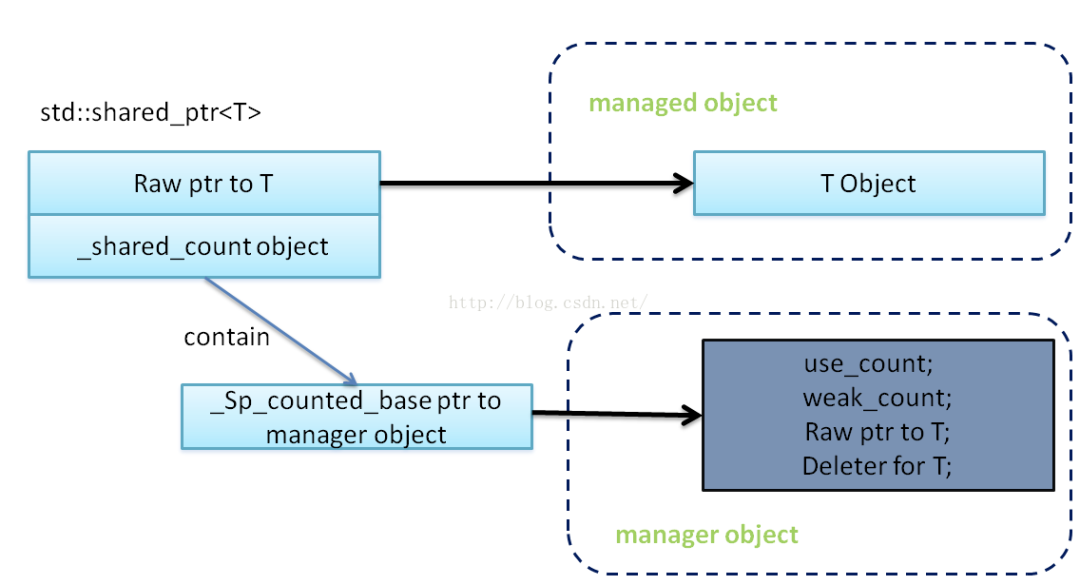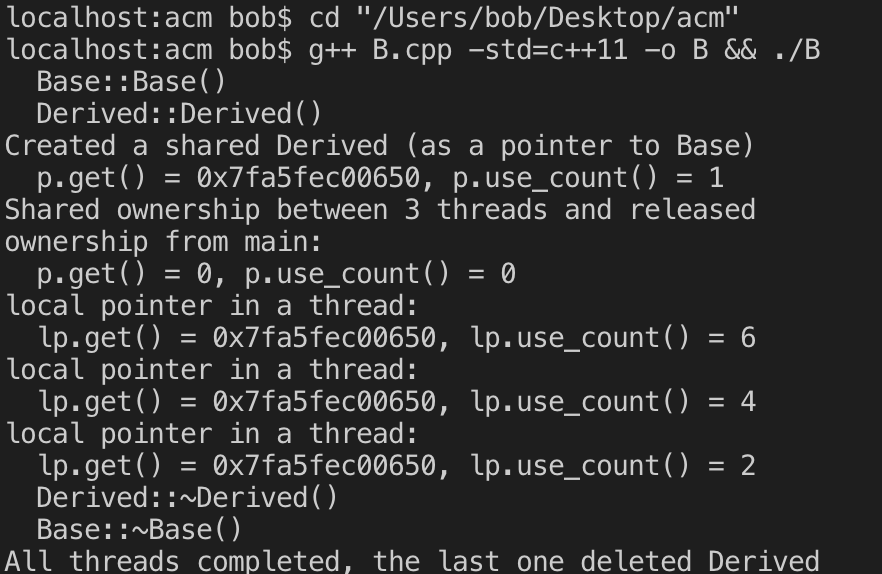C++11 智能指针
上一篇线程池里,有一个返回std::shared_ptr<T>对象,他其实是c++里面的智能指针
一、std::shared_ptr
shared_ptr共享被管理对象,同一时刻可以有多个shared_ptr拥有对象的所有权,当最后一个shared_ptr对象销毁时,被管理对象自动销毁

std::shared_ptr大概总结有以下几点:
(1) 智能指针主要的用途就是方便资源的管理,自动释放没有指针引用的资源。
(2) 使用引用计数来标识是否有多余指针指向该资源。(注意,shart_ptr本身指针会占1个引用)
(3) 在赋值操作中, 原来资源的引用计数会减一,新指向的资源引用计数会加一。
std::shared_ptr<Test> p1(new Test);
std::shared_ptr<Test> p2(new Test);
p1 = p2;
(4) 引用计数加一/减一操作是原子性的,所以线程安全的。
(5) make_shared要优于使用new,make_shared可以一次将需要内存分配好。
std::shared_ptr<Test> p = std::make_shared<Test>();
std::shared_ptr<Test> p(new Test);
(6) std::shared_ptr的大小是原始指针的两倍,因为它的内部有一个原始指针指向资源,同时有个指针指向引用计数。
(7) 引用计数是分配在动态分配的,std::shared_ptr支持拷贝,新的指针获可以获取前引用计数个数。
以下是cppreference的代码例子,其实也蛮清楚的


#include <iostream> #include <memory> #include <thread> #include <chrono> #include <mutex> struct Base { Base() { std::cout << " Base::Base()\n"; } // 注意:此处非虚析构函数 OK ~Base() { std::cout << " Base::~Base()\n"; } }; struct Derived : public Base { Derived() { std::cout << " Derived::Derived()\n"; } ~Derived() { std::cout << " Derived::~Derived()\n"; } }; void thr(std::shared_ptr<Base> p) { std::this_thread::sleep_for(std::chrono::seconds(1)); std::shared_ptr<Base> lp = p; // 线程安全,虽然自增共享的 use_count { static std::mutex io_mutex; std::lock_guard<std::mutex> lk(io_mutex); std::cout << "local pointer in a thread:\n" << " lp.get() = " << lp.get() << ", lp.use_count() = " << lp.use_count() << '\n'; } } int main() { std::shared_ptr<Base> p = std::make_shared<Derived>(); std::cout << "Created a shared Derived (as a pointer to Base)\n" << " p.get() = " << p.get() << ", p.use_count() = " << p.use_count() << '\n'; std::thread t1(thr, p), t2(thr, p), t3(thr, p); p.reset(); // 从 main 释放所有权 std::cout << "Shared ownership between 3 threads and released\n" << "ownership from main:\n" << " p.get() = " << p.get() << ", p.use_count() = " << p.use_count() << '\n'; t1.join(); t2.join(); t3.join(); std::cout << "All threads completed, the last one deleted Derived\n"; }

但是有没有可能double free呢
double Free其实就是同一个指针free两次。虽然一般把它叫做double free。其实只要是free一个指向堆内存的指针都有可能产生可以利用的漏洞。
double free的原理其实和堆溢出的原理差不多,都是通过unlink这个双向链表删除的宏来利用的。只是double free需要由自己来伪造整个chunk并且欺骗操作系统
简单来说,shared_ptr实现包含了两部分,
-
一个指向堆上创建的对象的裸指针,raw_ptr
-
一个指向内部隐藏的、共享的管理对象。share_count_object
第一部分没什么好说的,第二部分是需要关注的重点:
-
use_count,当前这个堆上对象被多少对象引用了,简单来说就是引用计数。
-
weak_count,这个管理对象被多少个智能指针共享了,简单来说就是管理对象的引用计数。
不同指针创建的对同一个堆上对象的智能管理,并不共享管理对象,因此存在double free的可能性
二、std::weak_ptr
它用于解决 std::shared_ptr 可能引发的循环引用问题。std::weak_ptr 本身并不会增加资源的引用计数,因此不会影响资源的生命周期。它提供了一种安全地访问被 std::shared_ptr 管理的对象的方式,同时避免了循环引用导致的内存泄漏问题。
以下是cppreference的代码例子
#include <iostream> #include <memory> std::weak_ptr<int> gw; void observe() { std::cout << "gw.use_count() == " << gw.use_count() << "; "; // we have to make a copy of shared pointer before usage: if (std::shared_ptr<int> spt = gw.lock()) std::cout << "*spt == " << *spt << '\n'; else std::cout << "gw is expired\n"; } int main() { { auto sp = std::make_shared<int>(42); gw = sp; observe(); } observe(); }
三、std::unique_ptr
独占所有权的智能指针,每次只能有一个 std::unique_ptr 指向某个对象。当它的生命周期结束时,它所拥有的资源(例如动态分配的内存)会自动释放。
以下是cppreference的代码例子
#include <cassert> #include <cstdio> #include <fstream> #include <iostream> #include <locale> #include <memory> #include <stdexcept> // helper class for runtime polymorphism demo below struct B { virtual ~B() = default; virtual void bar() { std::cout << "B::bar\n"; } }; struct D : B { D() { std::cout << "D::D\n"; } ~D() { std::cout << "D::~D\n"; } void bar() override { std::cout << "D::bar\n"; } }; // a function consuming a unique_ptr can take it by value or by rvalue reference std::unique_ptr<D> pass_through(std::unique_ptr<D> p) { p->bar(); return p; } // helper function for the custom deleter demo below void close_file(std::FILE* fp) { std::fclose(fp); } // unique_ptr-based linked list demo struct List { struct Node { int data; std::unique_ptr<Node> next; }; std::unique_ptr<Node> head; ~List() { // destroy list nodes sequentially in a loop, the default destructor // would have invoked its `next`'s destructor recursively, which would // cause stack overflow for sufficiently large lists. while (head) { auto next = std::move(head->next); head = std::move(next); } } void push(int data) { head = std::unique_ptr<Node>(new Node{data, std::move(head)}); } }; int main() { std::cout << "1) Unique ownership semantics demo\n"; { // Create a (uniquely owned) resource std::unique_ptr<D> p = std::make_unique<D>(); // Transfer ownership to `pass_through`, // which in turn transfers ownership back through the return value std::unique_ptr<D> q = pass_through(std::move(p)); // p is now in a moved-from 'empty' state, equal to nullptr assert(!p); } std::cout << "\n" "2) Runtime polymorphism demo\n"; { // Create a derived resource and point to it via base type std::unique_ptr<B> p = std::make_unique<D>(); // Dynamic dispatch works as expected p->bar(); } std::cout << "\n" "3) Custom deleter demo\n"; std::ofstream("demo.txt") << 'x'; // prepare the file to read { using unique_file_t = std::unique_ptr<std::FILE, decltype(&close_file)>; unique_file_t fp(std::fopen("demo.txt", "r"), &close_file); if (fp) std::cout << char(std::fgetc(fp.get())) << '\n'; } // `close_file()` called here (if `fp` is not null) std::cout << "\n" "4) Custom lambda-expression deleter and exception safety demo\n"; try { std::unique_ptr<D, void(*)(D*)> p(new D, [](D* ptr) { std::cout << "destroying from a custom deleter...\n"; delete ptr; }); throw std::runtime_error(""); // `p` would leak here if it were a plain pointer } catch (const std::exception&) { std::cout << "Caught exception\n"; } std::cout << "\n" "5) Array form of unique_ptr demo\n"; { std::unique_ptr<D[]> p(new D[3]); } // `D::~D()` is called 3 times std::cout << "\n" "6) Linked list demo\n"; { List wall; const int enough{1'000'000}; for (int beer = 0; beer != enough; ++beer) wall.push(beer); std::cout.imbue(std::locale("en_US.UTF-8")); std::cout << enough << " bottles of beer on the wall...\n"; } // destroys all the beers }
四、std::move
本质上是一种类型转换,将对象从左值引用转换为右值引用,从而可以触发移动构造函数或移动赋值运算符,从而避免不必要的复制
示例
#include <iostream> int main() { int a = 42; // 声明一个右值引用,绑定到变量 a int&& rref = std::move(a); std::cout << "a: " << a << std::endl; // a 可能已经无效,不建议使用 std::cout << "rref: " << rref << std::endl; rref = 77; std::cout << "a: " << a << std::endl; // a 可能已经无效,不建议使用 std::cout << "rref: " << rref << std::endl; int&& d = rref++; std::cout << "rref: " << d << std::endl; // int&& e = ++rref; cannot bind rvalue reference of type ‘int&&’ to lvalue of type ‘int’ return 0; }
左值引用:type &引用名 = 左值表达式;就是对左值的引用 就是给左值取别名
右值引用:type &&引用名 = 右值表达式;就是对右值的引用 就是给右值取别名
五、boost::intrusive_ptr
自己管理的智能指针,intrusive_ptr 类似shared_ptr,也是一种引用计数型智能指针,但需要额外增加一些代码才能使用它。
#include <boost/intrusive_ptr.hpp> class MyClass { public: MyClass(int value) : data(value), ref_count(0) {} void AddRef() { ++ref_count; } void Release() { if (--ref_count == 0) { delete this; } } void PrintData() { std::cout << "Data: " << data << std::endl; } private: int data; int ref_count; }; void intrusive_ptr_add_ref(MyClass* obj) { obj->AddRef(); } void intrusive_ptr_release(MyClass* obj) { obj->Release(); } int main() { boost::intrusive_ptr<MyClass> ptr(new MyClass(42)); ptr->PrintData(); // 调用对象的成员函数 return 0; // ptr 离开作用域时会自动释放 }
附录1、指针的一些小概念
//-------常量指针------- const int *p1 = &a; a = 400; //OK,仍然可以通过原来的声明修改值, //*p1 = 56; //Error,*p1是const int的,不可修改,即常量指针不可修改其指向地址 p1 = &b; //OK,指针还可以指向别处,因为指针只是个变量,可以随意指向; //-------指针常量-------// int* const p2 = &a; a = 500; //OK,仍然可以通过原来的声明修改值, *p2 = 400; //OK,指针是常量,指向的地址不可以变化,但是指向的地址所对应的内容可以变化 //p2 = &b; //Error,因为p2是const 指针,因此不能改变p2指向的内容 //-------指向常量的常量指针-------// const int* const p3 = &a; //*p3 = 1; //Error //p3 = &b; //Error a = 5000; //OK,仍然可以通过原来的声明修改值
本文来自博客园,作者:暴力都不会的蒟蒻,转载请注明原文链接:https://www.cnblogs.com/BobHuang/p/11259543.html


 浙公网安备 33010602011771号
浙公网安备 33010602011771号